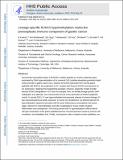| dc.contributor.author | Kurklu, B | |
| dc.contributor.author | Whitehead, R H | |
| dc.contributor.author | Ong, E K | |
| dc.contributor.author | Minamoto, T | |
| dc.contributor.author | Mann, J R | |
| dc.contributor.author | Judd, L M | |
| dc.contributor.author | Giraud, A S | |
| dc.contributor.author | Menheniott, T R | |
| dc.contributor.author | Fox, James G | |
| dc.date.accessioned | 2017-04-14T20:42:10Z | |
| dc.date.available | 2017-04-14T20:42:10Z | |
| dc.date.issued | 2014-08 | |
| dc.date.submitted | 2014-06 | |
| dc.identifier.issn | 0950-9232 | |
| dc.identifier.issn | 1476-5594 | |
| dc.identifier.uri | http://hdl.handle.net/1721.1/108192 | |
| dc.description.abstract | Runt domain transcription factor 3 (RUNX3) is widely regarded as a tumour-suppressor gene inactivated by DNA hypermethylation of its canonical CpG (cytidine-phosphate-guanidine) island (CGI) promoter in gastric cancer (GC). Absence of RUNX3 expression from normal gastric epithelial cells (GECs), the progenitors to GC, coupled with frequent RUNX3 overexpression in GC progression, challenge this longstanding paradigm. However, epigenetic models to better describe RUNX3 deregulation in GC have not emerged. Here, we identify lineage-specific DNA methylation at an alternate, non-CGI promoter (P1) as a new mechanism of RUNX3 epigenetic control. In normal GECs, P1 was hypermethylated and repressed, whereas in immune lineages P1 was hypomethylated and widely expressed. In human GC development, we detected aberrant P1 hypomethylation signatures associated with the early inflammatory, preneoplastic and tumour stages. Aberrant P1 hypomethylation was fully recapitulated in mouse models of gastric inflammation and tumorigenesis. Cell sorting showed that P1 hypomethylation reflects altered cell-type composition of the gastric epithelium/tumour microenvironment caused by immune cell recruitment, not methylation loss. Finally, via long-term culture of gastric tumour epithelium, we revealed that de novo methylation of the RUNX3 canonical CGI promoter is a bystander effect of oncogenic immortalization and not likely causal in GC pathogenesis as previously argued. We propose a new model of RUNX3 epigenetic control in cancer, based on immune-specific, non-CGI promoter hypomethylation. This novel epigenetic signature may have utility in early detection of GC and possibly other epithelial cancers with premalignant immune involvement. | en_US |
| dc.language.iso | en_US | |
| dc.publisher | Nature Publishing Group | en_US |
| dc.relation.isversionof | http://dx.doi.org/10.1038/onc.2014.233 | en_US |
| dc.rights | Creative Commons Attribution-Noncommercial-Share Alike | en_US |
| dc.rights.uri | http://creativecommons.org/licenses/by-nc-sa/4.0/ | en_US |
| dc.source | PMC | en_US |
| dc.title | Lineage-specific RUNX3 hypomethylation marks the preneoplastic immune component of gastric cancer | en_US |
| dc.type | Article | en_US |
| dc.identifier.citation | Kurklu, B et al. “Lineage-Specific RUNX3 Hypomethylation Marks the Preneoplastic Immune Component of Gastric Cancer.” Oncogene 34.22 (2015): 2856–2866. | en_US |
| dc.contributor.department | Massachusetts Institute of Technology. Department of Biological Engineering | en_US |
| dc.contributor.department | Massachusetts Institute of Technology. Division of Comparative Medicine | en_US |
| dc.contributor.mitauthor | Fox, James G | |
| dc.relation.journal | Oncogene | en_US |
| dc.eprint.version | Author's final manuscript | en_US |
| dc.type.uri | http://purl.org/eprint/type/JournalArticle | en_US |
| eprint.status | http://purl.org/eprint/status/PeerReviewed | en_US |
| dspace.orderedauthors | Kurklu, B; Whitehead, R H; Ong, E K; Minamoto, T; Fox, J G; Mann, J R; Judd, L M; Giraud, A S; Menheniott, T R | en_US |
| dspace.embargo.terms | N | en_US |
| dc.identifier.orcid | https://orcid.org/0000-0001-9307-6116 | |
| mit.license | OPEN_ACCESS_POLICY | en_US |
